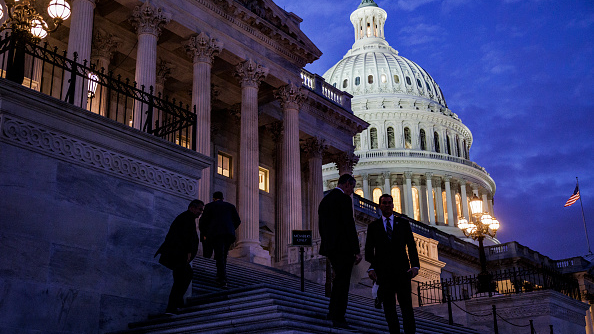
People visit Badachu Park in Beijing, capital of China, October 2, 2019. /Xinhua
People visit Badachu Park in Beijing, capital of China, October 2, 2019. /Xinhua
Editor's note: Abu Naser Al Farabi is a Dhaka-based columnist and analyst focusing on international politics, especially Asian Affairs. The article reflects the author's opinions and not necessarily those of CGTN.
While drawing a difference between Joe Biden's foreign policy and Donald Trump's, some political analysts point to the Biden administration's pivoting the "promotion of democracy" as a central focus to its foreign policy.
Albeit not unique, the U.S. has a long history of picking out such a thematic area and stirring up the notion of "us-vs-them" around it. With ample examples across U.S. history, such divisive endeavors have resulted in the partition of the global polity and a deviation from the solution of common challenges, thereby impeding global peace and prosperity.
To bandwagon around its agenda, the United States, in December last year, convened a so-called virtual Summit for Democracy with about 100 leaders from around the world. The summit scored criticism from across the world as a geopolitical gambit to split the global political landscape and conspicuous oblivion to the imminent urgencies global leaders require to lend more focus.
There is whether the U.S. can credibly host such a summit given the desultory condition of democracy in the country. But with its overlong history of "loudly advocating for democracy in principle and lavishly compromising on democracy in practice" and the rigidity of its self-styled "one-size-fit-for-all" democracy, it is more crucial to ask what type of democracy the U.S. wants to promote and what implicit agenda it wants to push through this foreign policy scheme?
An oft-cited phrase to explain what democracy means is former U.S. President Abraham Lincoln's famous saying, democracy is government "of the people, by the people and for the people." But, most often, so-called Western advocates of democracy assert importance on only one element of the axiom – "government by the people," ignoring the more critical components "government of the people" and "government for the people."
Given the number of factors that question the integrity of electoral democracy, such as elite influence, corporate dominance, money-driven polarized politics and rigged elections, a government voted in "by the people" stands to the query of how much does it reflect the people's consent?
If election turns out to be the only principle or yardstick to gauge the legitimacy of a government, turning a blind eye to whether the government truly represents the aspirations "of the people" and works to secure well-being "for the people," then it can't be a genuine democracy.
Another aspect of "true democracy," and unequivocally the most denoting dimension to weigh the representative value of a government, is the degree of people's policy involvement in the government.
A democracy where people are wooed during election time but left out after the election ends is merely a "systemic deception" of the people. True democracy lives in the people's sense of participation and belief endured upon an all-encompassing system, well-connected from the lowest strata of society to the highest policymaking echelon of government.

Members of the U.S. House of Representatives on the steps to the House chambers for a vote in Washington, D.C., U.S., October 28, 2021. /Getty
Members of the U.S. House of Representatives on the steps to the House chambers for a vote in Washington, D.C., U.S., October 28, 2021. /Getty
Again, democracy is more governance than the government itself. It is an outright fallacy to judge a system's righteousness based on how much it conforms to the long-fixated doctrinaire features that are ill-crafted to serve established "systemic worms." True democracy can only be realized, should it be evolved from the very traditions and cultures of the people to be governed, bend to the trends of the time and guarantee economic development and justice, social stability and a better living standard "for their people."
Implicit but well-known, a cold-war motivated mentality, with an all-out aim to undermine China's rise, has driven the Biden administration to convene the polarizing "Summit for Democracy."
As the arrows from the U.S. strategic quiver are decimated, it appears to wield its old, and even obsolete in terms of today's globalized system, ideological weapon, triggering a global rift by invoking so-called democracy vs. authoritarianism.
For the United States, it is better to go through some soul-searching. It needs to look at its own system of governance that has utterly exposed its systematic dysfunctions and weakness during the early days of the pandemic. Its so-called universally democratic principles have begotten a society fraught with racism, inequality, xenophobia and political polarization and brought about a world with more instability, war and division.
By contrast, China has shown a strong "systemic resilience" in containing the pandemic and putting its economy into a quick and robust recovery track. It is not due to harsh measures, as alleged by the West to legitimize their failure. China adapted to curb the pandemic quite quickly. But owing to its all-encompassing, whole-process and technology-integrated governance system. China has established a governance mechanism grounded in its own culture, tradition and people's aspirations, not one based on alien ideas.
But it doesn't mean China's system is rigid to its roots. Across the different stages of its history, it has demonstrated a striking capability to adapt to the changes the time demanded. With robust amalgamation and a mechanism for redress, its governing apparatus has concretely connected every corner of society to the nerve center of government and demonstrated salient responsiveness to the people's voices and grievances.
Over the last at least three decades, China's system of governance, grounded on "socialism with Chinese characteristics," has shown that true democracy serves the people; it is not some self-serving prerogative principles preached in vain.
(If you want to contribute and have specific expertise, please contact us at opinions@cgtn.com.)

